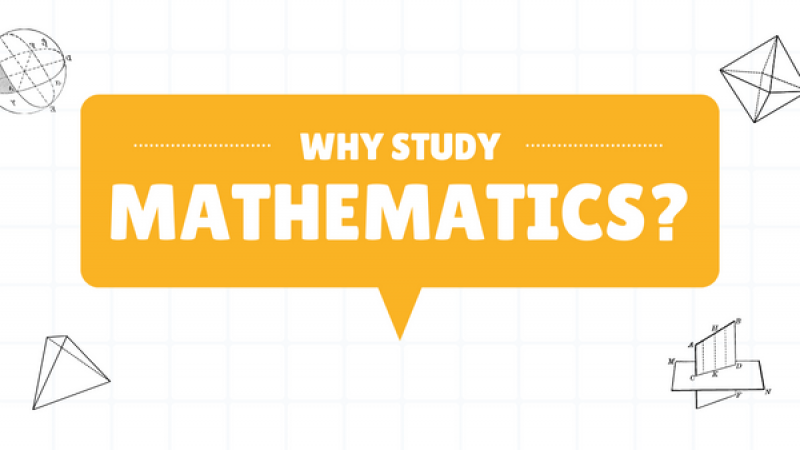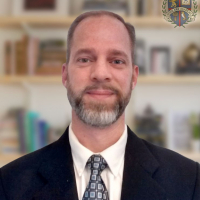Why Study Mathematics?

“Why do I need to know this?”
“When am I ever going to use this?”
Do these questions sound familiar? They do to me! Having taught mathematics for close to two decades now, I would rank these as the top two most frequently asked questions. We can, after all, understand the practicality of learning another language, and it is definitely important to know how to read and write. It is certainly interesting to learn about people and places in geography and how and why things work in science. But mathematics seems to depart from reality as students move up into high school. Moving from basic every day fractions, measurement and counting money to 5th degree polynomials and inverse trigonometric functions, students begin to wonder why on earth they need to learn these abstract concepts that are seemingly unrelated to anything in life. To better understand the struggle that so many students face and to find the answers to these questions, we need a new set of lenses with which to see a subject that, unbeknownst to many of us, has literally turned the world upside down!
First and foremost, mathematics manifests so many aspects of the nature and character of God. Its wonder and mystery, beauty and precision, immutability (or “unchangeableness”) and permanence, order and structure, depth and complexity are indeed a testimony to the very nature of God by Whom and for Whom all things were made. The Author of mathematics has been pleased to reveal Himself through the subject of mathematics so that we, the students of mathematics, may learn more of the excellence and perfection of His being.
Mathematics testifies to God's law which is truth. His rules, laws and principles transcend time and culture. They are universally applicable and binding on all men. In the same way, the rules, laws and principles contained within mathematics are the same all over the world, and they don't change over time. As He is, so are they – the same yesterday, today and forever! This is especially important in a culture where truth is relative - whatever you want it to be. Mathematics cuts through the postmodern fog and says no, there is a standard – an absolute standard of truth. There is true and false. There is black and white. There IS right and wrong.
God Himself used all of mathematics to create the world and He sustains the world by these very same principles. It was all there in the beginning and He left it for man to discover, to use, and to enjoy progressively over the unfolding of time. The principles of mathematics explain how and why so many things work the way they do. Mathematics is extremely useful, practical, and relevant in the real world - from the basic, everyday math that we all use in varying degrees to the highly complex and specialized math that many students will go on to use in a career to which God may call them.
Mathematics is one of the many tools that has been given to man for his benefit, enjoyment, and as a way to take dominion over the earth. With the progressive unveiling of mathematics over the centuries have come many exciting inventions and innovative discoveries that have blessed and enhanced our lives. In the tapestries of engineering, science, medicine, business - you name it - mathematics is that common thread that permeates its way through all of them. We must realize that even if we don't end up doing something directly with math, every day we directly benefit from someone else who has and is doing it. Whether we realize it or not, our whole lives are better because of mathematics.
“Okay, I understand that God’s glory is revealed in mathematics, but I still just can’t help wondering sometimes . . . when am I ever going to actually USE any of this stuff?"
After reading Part I about the glory of God revealed in the subject of mathematics, most students would be willing to back down just a little and admit that there is definitely something deeper and more valuable in studying mathematics. It glorifies God by testifying to His character, His truth and His providence in our daily lives; however, I know that there still remains an unsettled matter in their minds . . . and that is what Part 2 is all about. “That is all fine and well, but when am I ever going to actually USE any of this stuff?!”
I sense the tension. I see the struggle. Students are desperately trying to make a connection to the real world. I am happy to oblige. I will answer this question with a football analogy. But before I do, I think it is important to shed some light on why I think students have this type of question in the first place.
When you ask any student, “What is an education?,” the answers reveal a sad truth lurking in our culture – that an education is nothing more than a means to an end. A suitable illustration that might sum up the majority perspective is students lined up against a wall while teachers pelt them with random facts that will help them get a job one day. “Why do you take Algebra I?” “Well, so that you can be ready for Algebra II.” “Why take Algebra II?” “Well, it prepares you for Pre-Calculus.” “Why do you need Pre-Calculus?” “Well, you really don't, but it's a requirement to graduate.” “Why do you need to graduate?” “So that I can go to college.” “Why go to college?” “So that I can graduate (again).” “Why do you need to graduate from college?” “So that I can get a good job.”
So, is that it? This thing we call “school” has been nothing more than an educational conveyor belt in a factory somewhere? A series of mechanical steps that we grin and bear just so that we can get a job one day? Surely there must be more!
A study of the history of classical education reveals quite the opposite of this seemingly meaningless and monotonous journey to some unknown career out there in the future. Today’s education is a sad departure from its original intent – that being the developing of a rational and thinking human being through the disciplined and rigorous study of languages, literature, logic etc. Education was not just a means to an end. It was an end in and of itself – an exodus out of the bondage of darkness and ignorance and a journey toward the fashioning of rational and civilized human beings in tune with the times and the culture.
It was the cultivation of people who were able to make valuable insights and contributions to our world through intelligent and enlightened observation and conversation. This certainly had an impact on what career someone was going to pursue, but that was not its primary intent. Students today are swimming in a cultural stream where the philosophy of education is purely vocational – that its sole purpose is to prepare them for a job. That's why they want to know how they are going to use all this “stuff.” So, it’s time for another reformation, an academic one this time, - one that proposes that education is not just a means to an end, but an end in and of itself - that education is intrinsically valuable, entirely necessary, and dare-we-say even “enjoyable” all by itself!
That brings us to the football analogy I mentioned earlier. Football players train for the game of football in a gym. They do things like bench pressing, squats, tricep extensions, bicep curls, and the like. Do you realize that during an actual football game, they do none of these exercises on the field - not a single one? Well, I suppose you could argue that bench pressing might help get you out from under a bunch of smelly and heavy guys all piled up on top of you, but that’s beside the point. When these football players are in the gym, they never wonder whether these exercises are relevant to the game. No football player does a bicep curl and asks, “Why do I need to know this?” or “When am I ever going to use this?” Diligently executing every move, they just know that this overall body conditioning taking place through seemingly irrelevant exercises makes them better and stronger players out there on the football field.
Have you connected the dots yet? In the same way that working out in the weight room makes for stronger football players, mathematics is the gym for the mind. It is a place where a variety of rigorous exercises are performed and repeated that train you to process information systematically, to think critically, and to reason logically. They may seem like irrelevant exercises, but they are training you for real-life skills. Students become so focused on the physical processes of factoring, squaring, and dividing that they wonder if they will ever need to do this again.
They forget, however, about the mental processes that are taking place behind the scenes. Sorting through rules and principles, trying to remember whether they apply to this situation or that, thinking through and organizing steps in their mind, wrestling with abstract concepts, and using logic to determine outcomes are all crucial exercises that are causing them to grow and mature intellectually as rational and thinking human beings. Yes, people out there in the “real” world are actually using this stuff every day in practical ways. And yes, I know you have no intentions of going into any type of mathematical career, but hopefully, you can see why that doesn’t really matter anymore. Try to think more of how the study of mathematics contributes to your growth and development as a well-rounded, rational, thinking, and problem-solving human being.
This would almost be a great place to end but alas, in part 3, we encounter an enemy that lurks in the shadows, an enemy that must be conquered!
In Part 2, we learned how mathematics makes us better players out there in the game of life - how it conditions us to be better thinkers and problem solvers. But beware . . . there is an enemy that lurks. Part 3 will help you better understand this enemy and provide you with weapons for the battle. Read on . . .
Before we leave the gym we came to in Part 2, I want you to stop and look around for just a moment. You will see a variety of other people who have come here for a variety of reasons. Some don’t particularly enjoy working out, but they discipline themselves because they know that it is good for them and that it benefits them in the long run. For many, the pain is worth the overall increase in health and feeling of well-being that it brings. Others thoroughly enjoy working out. Either way, it doesn’t change the fact that it is hard work. It takes commitment, effort and determination. And so it is with mathematics. As fallen creatures, we gravitate towards the path of least resistance – to that which is easy and convenient. Just as we can be physically and spiritually lazy, we can also be academically lazy.
That is why mathematics and even just school in general is such a battle for some. It is no wonder that many students giggle and nod when they see a meme out there that says MATH actually stands for “Mental Abuse To Humans!” Our minds want to pull the covers up and sleep in, but Sergeant Math comes marching in bright and early and yells for us to get up and get running! Mathematics can be a very challenging and difficult subject at times, but it is good for us. It exhorts us to be diligent and to be disciplined. It teaches us to practice, to be patient and to persevere. It teaches us to be careful, thoughtful, organized, and meticulous. As sinners, we have fallen in every area, including academically. As Christians, we are being conformed to the image of Him, who is not only the author of every subject but also perfect in every subject. We must, therefore, strive to allow mathematics and education in general to do its work of sanctification in our thinking and in our reasoning.
For me personally, mathematics is a magical land of patterns, puzzles, mystery and adventure that calls for clever and creative thinking. Who doesn’t like to crack the code, solve a puzzle, or figure out a mystery? In factoring a trinomial, we are carefully unraveling a multiplication mystery by looking for that perfect pair of numbers whose product is the last term and whose sum is the middle term. Let’s work backward and see if we can figure this out! Solving equations is a daring and dangerous adventure where princess “x” has been captured and is trapped in a plethora of parenthetical prisons. Armed with the weapons of inverse operations, I must fight the enemies along the way, using each weapon appropriately and conquering each enemy until I can rescue the princess “x” and bring her safely to the other side of the equal sign.
When viewed this way, mathematics becomes a truly exciting and enjoyable experience! Stop fretting so much that you don’t “get it.” If this be the case, “gird up your loins” as the apostle Paul would say, mount your horse, draw your sword and embrace the challenge. Be brave. Go forth and conquer. When you return, a celebration awaits at the castle . . . a celebration of victory, of accomplishment, of triumph . . . along with that deep and abiding satisfaction of a successful conquest! I finally got it!
So dear students, perhaps it is time for some of you to extend a hand to a subject that is not the enemy and never has been – to make peace with a subject that is and always has been a mentor, a friend, and a faithful traveling companion in every civilization and culture since the dawn of time. Perhaps we need to realize that our thoughts and attitudes regarding mathematics and even education in general as “boring” and “irrelevant” have simply been another manifestation of our sinful nature and sinful thinking. Ultimately it comes down to this. God is the author of mathematics. His glory is revealed in its depth, complexity and wonder.
He has given it as a gift to mankind – both for its ability to teach us how to think and how to persevere in problem solving and for its practical use in our everyday world. Whether or not you ever factor a polynomial or graph a trigonometric function again in your entire life is actually completely irrelevant. It doesn't matter. Some will; most won't. However, the very study of mathematics is conditioning you to be better thinkers and problem solvers in that football game out there we call “life.” This mental conditioning makes you a better player. It is a necessary part of your growth and development as those made in the image of God and called to love Him with all of your heart, soul, MIND and strength. This cultivated mind is what God wants you to use to engage with a culture that has departed from reason and from the Truth – for the advancing of His eternal kingdom and for the glory of His great name.
This article originally written 10/23/19 by Veritas Scholars Academy teacher Damian Haarhoff







